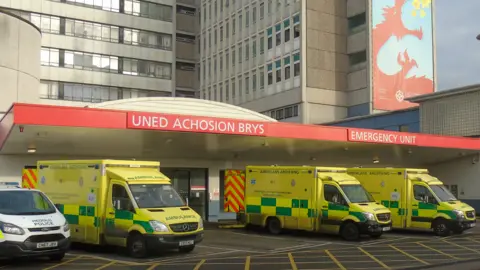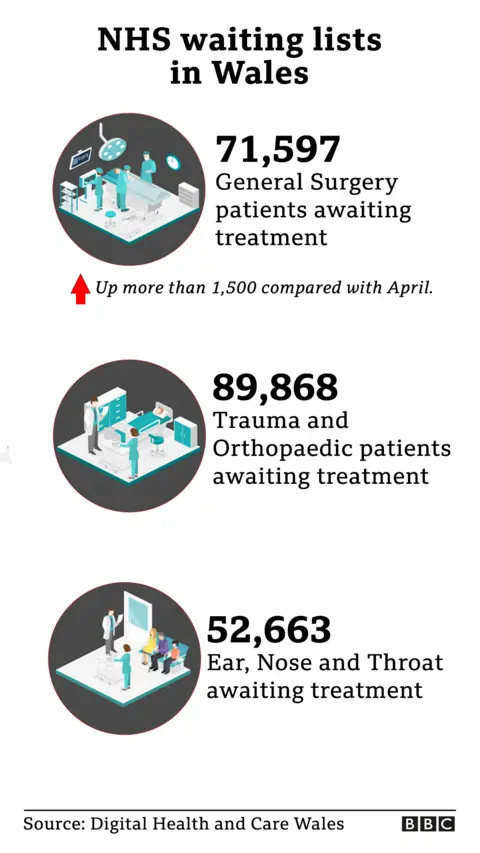NHS Wales: A&E waits longest in nine years as hospital admissions rise
 BBC
BBCAverage waiting times at emergency departments are the longest they have been in nine years, the latest figures show.
The Welsh Ambulance Trust also received more calls in June than in any month since the pandemic began.
More than 600,000 patients are waiting for treatment in Wales after record backlogs during the pandemic.
It comes as Wales' health minister pledged to "transform" the delivery of urgent care.
Eluned Morgan unveiled a strategy to reduce the number of people seeking hospital treatment.
It includes annual funding of £25m to "support people to access the right care in the right place".
The strategy comes after unions criticised the Welsh government's planned 3% pay rise for NHS staff.
The figures, published on Thursday, show the Welsh Ambulance Trust received more calls in June than in any month since the pandemic began.
There were 41,454 calls to the service last month, an average of 1,382 per day.
A record percentage of the calls received - 7.9% - were so-called "red calls" where incidents are classed as immediately life-threatening.
Meanwhile the average number of people admitted to emergency departments in Wales every day in June was 3,136 - the second-highest figure since comparable records began in April 2012.
Targets state 95% of all patients visiting A&E should be admitted, transferred or discharged within four hours and no patient should wait longer than 12 hours.
In June, 70.6% of patients spent less than four hours in A&E, a small drop on the previous month and 7.4% lower than June 2019, before the pandemic.
There was also an increase of 6.4% in the number of people waiting more than 12 hours compared with the previous month, and an increase of 43% compared to June 2019.
Average A&E waiting times increased to the longest since comparable records began in April 2012.
The figures showed that in May, 608,062 people were waiting to start treatment - more than 19% of the Welsh population and the highest figure since comparable data was first gathered in 2011.
It represents an increase of more than 5,000 since April.
In May, 227,753 patients had been waiting more than 36 weeks (nine months) - an increase of more than 5,000 compared with April, and nearly nine times more than pre-pandemic total from February 2020 (25,634).

Responding to the data, Ms Morgan said: "The latest data shows the pressure on emergency care services is growing beyond pre-pandemic levels and putting a huge strain on NHS staff.
Philip Banfield, chairman of the Welsh consultant committee at the British Medical Association Cymru, stressed that staff needed "the tools to do the job".
"There was a brief time at the start of the pandemic when people said: 'What do you need to do the job?' And we need to go back to that stage," he said.
Ms Morgan said demand on Wales' GPs and emergency departments had continued to grow beyond levels seen before the pandemic, adding: "Staff are under real pressure."
What is the Welsh government doing to improve waiting times?
The government, she said, wanted to make sure everyone could access the "high quality care they need in the right place, the first time".
"Often people feel they have no option but to go to their GP, call 999 or go to their nearest emergency department for advice or treatment," Ms Morgan said.
"But under our new plans, people with urgent care needs could be treated elsewhere by the many different health professionals working in NHS Wales."
Health boards have had funding to set up new "urgent primary care centres", she said, where people can be seen without the need for a GP appointment or to go to A&E.
She told BBC Radio Wales Breakfast with Claire Summers ambulance services saw a 45% rise in calls on Monday compared with the previous week.
She urged people to think "very carefully" about whether their accident was "genuinely" an emergency to help reduce waiting times.
Last month, Ms Morgan welcomed the rollout of a 111 service system for people in north Wales to get "non-urgent medical advice".
"What we're trying to do is make sure the public understands that there are alternatives to accident, emergency and GP services," she said.
The service has now been rolled out to all health board areas across Wales, except for the Cardiff and Vale area, which is expected to come later this financial year.
Additional money will also be made available for schemes to help people return home from hospital, reducing unnecessarily long stays and freeing up essential bed capacity.
The summer holidays and hot weather, along with the easing of lockdown restrictions and an increase in Covid cases, has heaped more pressure on the NHS.
The Welsh Conservatives called on the health minister to urgently come out with a plan, calling the numbers "extremely concerning".
"Without treatment, people simply cannot go about their daily lives," Russell George said.
Plaid Cymru welcomed the announcements of extra funding and better signposting, but said problems were "even deeper than before.
"I'll be looking for evidence of changes that make a difference in the long term, building more sustainable services at the heart of our communities," Rhun ap Iorwerth said.
 Getty Images
Getty ImagesOlwen Williams, vice president for Wales at the Royal College of Physicians, described the proposals as "a wonderful opportunity".
"Care in the community is definitely the way forward," she said.
"And we need our primary care teams, our ambulance services, our community services, social services and our medical services all to work together to ensure that individuals get the right care in the right place at the right time."
Dr Williams added there were "two big challenges" involved.
She said the first was whether people would accept the change of "care closer to home".
The second, she explained, was to do with staffing, and how health boards would deliver the changes.
'Unprecedented' demand
Wales Ambulance Service chief executive Jason Killens said a combination of factors in recent days had put the service under "extreme pressure".
"It's not just here in Wales that we're seeing this unprecedented level of demand on the emergency ambulance service, and indeed on the NHS as a whole," Mr Killens said.
"Our staff have been doing fantastic work for 18 months through the pandemic, and with this warmer weather, they are working in extremely difficult conditions and I pay tribute to them because they've all been fantastic."


